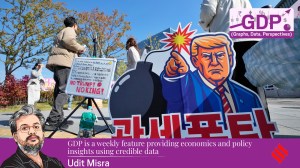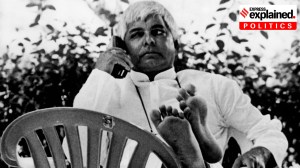The Spirit of April 21
On a visit to Pakistan in December 1989, the week after V.P. Singh was sworn in prime minister, the question I was asked all the time by ...

On a visit to Pakistan in December 1989, the week after V.P. Singh was sworn in prime minister, the question I was asked all the time by politicians, bureaucrats, journalists and even that most important of a travelling hack’s interlocutor, the taxi driver, was a surprise to me, as an Indian. How come, they asked, a prime minister lost an election and welcomed his rival into the chair with folded hands? How can that happen?
They had seen it all on television. Rajiv Gandhi, at his charming best, a disarming smile, hands folded, offering the prime minister’s chair to the man who had "betrayed" him, called him a thief and a bribe-taker, destroyed his Mr Clean image forever and just handed him a stunning defeat in the Hindi heartland. For a Pakistani, this was an incredible sight.
But, for even a hard-nosed Indian scribe, it was no big deal. We abuse our politicians all the time, and with good reason. They are venal, immoral, crude, cynical, irresponsible, self-seeking thugs, most of the time. But do we getso overwhelmed with this loathing and revulsion that we fail to see the few good things that even the Pakistanis noticed in the winter of 1989, that our political system has developed a democratic maturity and class that is nothing to be embarrassed about?
In this politician-bashing season, when tens of millions have just watched one of the most inane debates on a parliamentary confidence motion live on television, it is risky to write a defence of the politician. Even tougher to argue that the recent developments probably suggest a growing maturity in our political system. But I have got away with a few risks in my line of business.
The idea, actually, came from a European diplomat who witnessed the debate. He was in the Lok Sabha, he said, when the confidence vote was taken. The ruling group lost by just one vote. The opposition won by one. Yet, look at the equanimity with which the entire House accepted the decision. No wild cheering. No bitter protests. No pushing and shoving. No hurling ofmicrophones. This despite the example set by legislators, particularly in Uttar Pradesh, in fairly recent times. Didn’t this indicate a maturing of your country’s political mind, he asked.
You could have ignored this as some usual sentimental European tripe but for the (dare I say marvellous?) manner in which the leaders of all our major parties, currently engaged in a battle for power so vicious they could poison each other’s lunch, got their act together in the national interest to pass the existing union budget today. Dare we call it the maturing of the Indian politician? Dare we call it The Spirit of April 21?
This was the sixth time in the past three years that a government faced a parliament as fractious as this over a confidence motion. And how many defections have we seen in the course of these? Perhaps not one, barring the odd, inadequately explained abstention. Before each one of these votes, the air in Delhi has been thick with rumours of suitcase persuasion, overnight cash-and-carry deals,splits and dissensions. We, including the India International Centre type eggheads and the media, tend to believe all this quite willingly, so low is the esteem in which we hold our politician, particularly after the JMM episode of the Rao phase. But presuming that all these temptations exist, and yet if even parties such as Mulayam Singh Yadav’s and Laloo Prasad Yadav’s are able to keep their flock together, could it be that we are being a little unfair to our politician?
In the course of the latest confidence vote there were really no major turnarounds, except Om Parkash Chautala’s, and he is certainly in a class all by himself. Mayawati’s, while a great surprise to the capital’s oversized community of sabjantawalla pundits, was no more than sweet revenge for Uttar Pradesh. So where did all the suitcases go? Obviously, Mukhtar Abbas Naqvi, the BJP’s garrulous minister of state for information and broadcasting, will claim vindication. He is so incensed by Bollywood’s caricaturing of the politicianas a corrupt, criminal lout that he wishes to pass a law banning it.
It is tough, almost impossible, to be arguing on the same side as Naqvi. But once in a while, even in these cynical times, we have seen our politicians rise above themselves in the larger national interest, and the passing of the budget is only one example. Less than a fortnight ago, at Anandpur Sahib, where the Akali Dal’s dharmayudh against the Congress-led centre began in 1978 with the famous autonomy resolution, we saw the very unusual sight of senior Congress leaders Sharad Pawar and Manmohan Singh sharing the Akali Dal’s stage along with Vajpayee, Advani and Mamata Banerji. One Akali speaker after another lauded Sharad Pawar as a great leader from Maharashtra, the land of Guru Gobind Singh’s martyrdom, a heroic legatee of Shivaji. Manmohan Singh was repeatedly called a great son of Punjab who brought India’s gold and jewellery back and it is just as well that Yashwant Sinha, whose painful fate it had been to pawn it in themonths of bankruptcy in 1991, wasn’t around.
When was the last time the Akali and the Congress leaders were seen on any political platform not abusing each other? When was the last time they even shared a platform? I put these questions to Parkash Singh Badal. Not for a very long time, he said, and others guessed it may have been during the 1971 war because, since then, the two parties have been fighting each other with bitterness that an Akali politician colourfully described as "itt-kutte da vair" (the enmity between the brick and the dog). But now, they had chosen to forget that legacy to join hands in the tercentenary celebrations of the Khalsa.
This was by no means a purely religious event, it was a show so political and so typically Akali that the Tohra and Badal group were even fighting for control. But it also established Punjab’s return to normalcy after a decade of bloodletting. So now they were eating around the same table, celebrating the end of a most forgettable period, Badal seekingManmohan’s advice on how to industrialise Punjab, his son Sukhbir calling himself Manmohan’s shagird (pupil).
You could say with good reason that this is only one side of the story. True, and you read the other side all over our newspapers, particularly this one, as it tends to question and critique, challenge and lambast those in the establishment. There is a lot wrong with our politicians. For if that wasn’t so, the country would not have been in such a mess. A lot can still go wrong. Yet, if things were so hopeless the same squabbling self-seekers would not have agreed to gather this morning to pass the BJP’s budget, cementing a national consensus on the economy that may be more vital for our future than the old one on security and foreign policies. Now three different governments, representing the three dominant streams in our polity, have passed similar budgets, the last having been passed by all three together. That is why we have something to celebrate: The Spirit of April 21.



- 01
- 02
- 03
- 04
- 05




























